JULY 2010 DOWNLOAD ROUNDUP
Brian Wilson
Download of the Month
George Frideric HANDEL (1685-1759)
Concerti Grossi, Op.6
Avison Ensemble/Pavlo Beznosiuk -rec. Jubilee Theatre, St Nicholas’
Hospital, Newcastle Upon Tyne, UK, 27-31 October 2008. DDD.
LINN RECORDS CKD362 [3 CDs: 60:03 + 59:46 + 40:49] –
from Linn
(SACD, mp3, lossless and Studio Master)
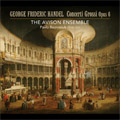 I
downloaded this just as I was about to close this Roundup, so
I have had time to hear it all through just once, though I have
listened to some of the concertos several times. I am very impressed
– this could well become my benchmark in future for this wonderful
music, alongside, or even replacing Hogwood (Decca, now Avie),
Standage (Chandos) and Pinnock (DG): everything seems so right
and appropriate in scale that I’m going to choose it as my last-minute
Download of the Month. It may seem odd to single out
the continuo, but even that seems to be exactly in proportion
– just audible but not obtrusive – and imaginative, with organ
(not credited) and a copy of a 1745 harpsichord. The price is
right, too, ranging from £13 for mp3 to £25 for the 24-bit Studio
Master. Make sure that your player will accept 24/88.2 downloads
if you are planning to go for the latter: otherwise, the ‘ordinary’
CD-quality WMA sounds excellent.
I
downloaded this just as I was about to close this Roundup, so
I have had time to hear it all through just once, though I have
listened to some of the concertos several times. I am very impressed
– this could well become my benchmark in future for this wonderful
music, alongside, or even replacing Hogwood (Decca, now Avie),
Standage (Chandos) and Pinnock (DG): everything seems so right
and appropriate in scale that I’m going to choose it as my last-minute
Download of the Month. It may seem odd to single out
the continuo, but even that seems to be exactly in proportion
– just audible but not obtrusive – and imaginative, with organ
(not credited) and a copy of a 1745 harpsichord. The price is
right, too, ranging from £13 for mp3 to £25 for the 24-bit Studio
Master. Make sure that your player will accept 24/88.2 downloads
if you are planning to go for the latter: otherwise, the ‘ordinary’
CD-quality WMA sounds excellent.
Reissue of the Month
Arnold BAX (1883-1953)
Tintagel [13:35]
Ralph VAUGHAN WILLIAMS (1872-1958)
Old King Cole [19:05]
William WALTON (1902-1983)
Siesta [4:35]; Portsmouth Point [5:46]; Scapino [8:49]
Malcolm ARNOLD (1921-2006)
English Dances [17:22]
London Philharmonic Orchestra/Sir Adrian Boult – rec. October/November
1954. ADD.
BEULAH 5PD12 [69:33] – available shortly from iTunes
(mp3) – click here
for link
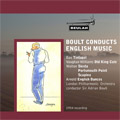 There
are more recent, highly recommendable versions of all this music,
but Boult has a special touch in this repertoire, making even
Old King Cole well worth hearing: the only other version
that I know of that ballet (Richard Hickox, EMI British Composers
5739862) doesn’t manage that quite so effectively. It is at
least arguable, too, that this version of Tintagel is
preferable to Boult’s own remake on Lyrita (SRCD231 – see review).
There
are more recent, highly recommendable versions of all this music,
but Boult has a special touch in this repertoire, making even
Old King Cole well worth hearing: the only other version
that I know of that ballet (Richard Hickox, EMI British Composers
5739862) doesn’t manage that quite so effectively. It is at
least arguable, too, that this version of Tintagel is
preferable to Boult’s own remake on Lyrita (SRCD231 – see review).
Having recently, and controversially, been compelled to retire
by the BBC, Boult was snapped up in the early 1950s by the LPO
and Decca, for whom he made some very fine recordings, notably
of the Vaughan Williams symphonies.
These performances of Tintagel and Old King Cole,
differently coupled, remain available on the budget Belart label
(461 3542) but the collection assembled on Beulah is at least
equally desirable. The recording doesn’t sound new-minted –
even in 1955 the Gramophone reviewer commented on the
lack of depth to the sound in Old King Cole and suspected
that Tintagel did not lend itself to recording – but
the mp3 transcription does it justice, sounding much better
than the LPs did in 1955, I suspect. The sound-stage has been
opened out to the extent that I imagined that some of the tracks
were in stereo; they aren’t. The pre-release CD copy which I
received is at 256k, the same rate as the iTunes download, which
should be available by the time that you read this review. The
12” LP which contained Tintagel and King Cole
cost 36 shillings in 1955 (at least £40 now), so this reissue
is a true bargain as well as offering an hour of delight.
More Boult recordings of English music are promised from Beulah
in July. Watch this space.
Josquin DES PREZ (c1450/55–1521)
Mente tota, 4vv (Quinta pars from
the cycle Vultum tuum deprecabuntur) [4:04]
Adrian WILLAERT (c1490–1562)
Missa Mente tota, 6vv [35:00]; Laus tibi, sacra
rubens5vv[4:41]; Creator omnium, Deus6vv [3:16];
O iubar, nostrae specimen salutis6vv [11:34]; Verbum
bonum et suave6vv[7:08]; Quid non ebrietas?4vv [1:56]
Cipriano DE RORE (c1515/16–1565)
Concordes adhibete animos (in mortem Adriani Willaert)
5vv [3:06]
Cinquecento - Renaissance Vokal (Terry Wey, Jakob Huppmann
(counter-tenor); Tore Tom Denys, Thomas Künne (tenor);
Tim Scott Whiteley (baritone); Ulfried Staber (bass))
rec. June 2009, Wallfahrtskirche, St Wolfgang bei Weitra, Austria.
DDD.
Booklet with texts and translations available as pdf download
– or click on each track in Squeezebox for text and translation.
HYPERION CDA67749 [70:47] – from Hyperion
(mp3 and lossless)
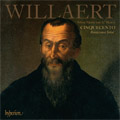 After
last month’s service to Moulu, Hyperion have done the same for
Willaert – a little better known, but not by much. That the
main work here, Willaert’s Missa mente tota, was based
on Josquin’s 4-part motet is appropriate, since he lived under
the shadow of his renowned predecessor to such an extent that
his 6-part setting of Verbum bonum et suave was formerly
attributed to Josquin. When the Papal choir discovered that
it was, in fact, by Willaert, his biographer tells us that they
refused to sing it again, a story long believed to be apocryphal,
but given some credence in the Hyperion booklet of notes.
After
last month’s service to Moulu, Hyperion have done the same for
Willaert – a little better known, but not by much. That the
main work here, Willaert’s Missa mente tota, was based
on Josquin’s 4-part motet is appropriate, since he lived under
the shadow of his renowned predecessor to such an extent that
his 6-part setting of Verbum bonum et suave was formerly
attributed to Josquin. When the Papal choir discovered that
it was, in fact, by Willaert, his biographer tells us that they
refused to sing it again, a story long believed to be apocryphal,
but given some credence in the Hyperion booklet of notes.
True or not, the story illustrates Willaert’s comparative neglect
– less than a handful of recordings are currently devoted wholly
or principally to his music – a neglect which the present recording
remedies in style. Even Hyperion subjugated their earlier recording
of Verbum bonum to Josquin (Binchois Consort/Andrew Kirkman
on CDA67183. I sneaked that recording into my Hyperion Top 30
– here
– via the back door.) To add insult to injury, at least one
CD supplier heads the new recording with the name of Josquin.
The Binchois Consort recording of Verbum bonum is slower,
more inward, less forthright than the new Cinquecento version
– dare I say also a little duller: my mind inclines toward the
older recording, but my heart is more uplifted by the new version.
If I have a criticism of the new version, it is that the singing
is just a little too forthright throughout, though certainly
not to the extent that it spoiled my enjoyment.
Hyperion already had a recording of the complete Josquin cycle
Vultum tuum deprecebantur, performed by Westminster Cathedral
Choir under James O’Donnell and coupled with his Missa Pange
lingua and Planxit autem David (CDA66614, Archive
Service CD or mp3/lossless download here).
I’m sorry to see this fine recording relegated to the Archive
– perhaps, though, that means a pending reissue on the budget
Helios label? Sung by a cathedral choir, it’s complementary
to performances by professional groups – both the new Cinquecento
recording of Mente tota and the excellent Gimell recording
of the Mass. (For the latter, see my article on The Tallis Scholars
at 30 here.)
The Westminster version of Mente tota takes a mere four
seconds longer than Cinquecento, yet it has a more meditative
quality. It’s no use trying to decide which sounds more ‘authentic’;
I am content to enjoy both – either will take you into a different
world, one in which time seems to stand still.
After the new Hyperion, for more of Willaert’s church music
go to his Missa Christus resurgens [41:32]; Magnificat
sexti toni [5:33] and Ave Maria [5:07], with Jean
RICHAFORT (c.1480-c.1547) Christus resurgens
[4:13], performed by the Oxford Camerata/Jeremy Summerly on
NAXOS 8.553211 [56:26] – from classicsonline
(mp3) or stream from Naxos Music Library here.
Peter PHILIPS (1560/61–1628)
Cantiones sacrae - from Cantiones sacrae, pro præcipuis
festis totius anni et communi sanctorum (Antwerp, 1612)
Volume I
In Festo Nativitatis Domini. O beatum et sacrosanctum diem [2:34];
In Festo SS. Innocentium. Cantabant Sancti [2:57]; In Festo
S. Thomæ Martyris. Gaudeamus omnes [2:46]; In Festo Circumcisionis
Domini. O nomen Jesu [2:42]; In Festo Circumcisionis Domini.
Modo veniet Dominator [2:19]; In Festo Conversionis S. Pauli.
Tu es vas electionis [2:54]; In Festo Purificationis B. Mariæ.
Hodie beata Virgo Maria [4:35]; In Festo Resurrectionis Domini.
Christus resurgens [3:14]; In Festo Resurrectionis Domini. Surgens
Jesus [2:13]; In Festo SS. Philippi et Jacobi. Gentes Philippus
ducit [3:48]; In Festo Ascensionis Domini. Ascendit Deus [2:29];
In Festo Corporis Christi. Ave verum Corpus [3:48]; In Festo
Joannis Baptistæ. Gabriel Angelus [2:50]; In Festo S.
Annæ. Ave gratia plena [3:14]; In Festo S. Petri ad Vincula.
Surge Petre [3:31]
Volume II
In Festo Nativitatis B. Mariæ. Cum jucunditate [2:58];
In Festo S. Michælis. Factum est silentium [3:17]; In
Festo Omnium Sanctorum. Sancti mei [3:06]; In Festo S. Martini.
O beatum Martinum [3:01]; In Festo S. Cæciliæ. Cantantibus
organis [2:57]; [Commune Apostolorum] Tempore Paschali. Tristitia
vestra [2:05]; In Natalis plurimorum Martyrum. Gaudent in cælis
[2:35]; Antiphona B. Mariæ. Ave Regina cælorum [3:44];
Antiphona B. Mariæ [Prima pars]. Salve, Regina [3:41];
[Ad Placitum]. Ne reminiscaris, Domine [3:17]
Choir of Trinity College, Cambridge/Richard Marlow
rec. Trinity College Chapel, 11-13 January 2002. DDD.
Notes, texts and translations available to download as pdf.
CHANDOS CHAN0770 [77:55] – from theclassicalshop
(mp3 and lossless)
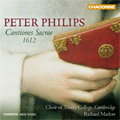 In
my May 2010 Roundup I recommended two recordings of the music
of Peter Philips, the ‘lost’ English composer, on Hyperion Helios
CDH55254 and Naxos 8.555056, both at budget price. Now Chandos
add to our understanding of Philips with a recording of 25 selections
from the two volumes of Cantiones Sacræ which he
published in Antwerp in 1612. Just four of the items on the
Helios recording and none of those on Naxos are duplicated here.
Better still, the singing is all that we have come to expect
from Trinity College Choir under Richard Marlow; the recording
and lossless transfer are good and the presentation is well
up to standard. I’m only surprised that Chandos have hung on
to this recording for so long. We now have three very good recordings
of Philips’ vocal music to add to Colin Booth’s recording of
his keyboard works which I reviewed some time ago (Soundboard
SBCD992 – see review).
In
my May 2010 Roundup I recommended two recordings of the music
of Peter Philips, the ‘lost’ English composer, on Hyperion Helios
CDH55254 and Naxos 8.555056, both at budget price. Now Chandos
add to our understanding of Philips with a recording of 25 selections
from the two volumes of Cantiones Sacræ which he
published in Antwerp in 1612. Just four of the items on the
Helios recording and none of those on Naxos are duplicated here.
Better still, the singing is all that we have come to expect
from Trinity College Choir under Richard Marlow; the recording
and lossless transfer are good and the presentation is well
up to standard. I’m only surprised that Chandos have hung on
to this recording for so long. We now have three very good recordings
of Philips’ vocal music to add to Colin Booth’s recording of
his keyboard works which I reviewed some time ago (Soundboard
SBCD992 – see review).
John DOWLAND (1563–1626)
Lachrimae or Seaven Teares (1604) [21:19]
MORITZ, Landgrave of Hessen-Kassel
(1572–1632) Pavan (from ‘Varietie of Lute-Lessons’, 1610)
[4:56]
DOWLAND Lachrimae:
Semper Dowland semper dolens [5:33]; M. Nicholas Gryffith
his Galiard [1:55]; M. Giles Hobies Galiard [1:24]; Sir John
Souch his Galiard [1:20]; Sir Henry Umptons Funerall [4:48];
M. George Whitehead his Almand [1:20]; Mistresse Nichols Almand
[0:36]; M. John Langtons Pavan [3:28]; M. Buctons Galiard [1:27];
M. Thomas Collier his Galiard with 2 Trebles [1:16]
Captaine Digorie Piper his Pavan (from Kassel 4° MS mus.125)
[3:38]
Lachrimae: Captaine Digorie Piper his Galiard [1:33]
The Earle of Essex Galiard [1:19]; M. Henry Noel his Galiard
[2:34]
The Most High and Mightie Christianus the fourth King of Denmarke,
his Galliard (from ‘Varietie of Lute-Lessons’, 1610) [2:35]
Lachrimae: The King of Denmarks Galiard [0:36]
The Parley of Instruments/Peter Holman, with Paul O’Dette (lute)
rec. 12-14 November, 1992. DDD. Pitch: A = 440Hz
HYPERION HELIOS CDH55339 [68:33] – from Hyperion
(mp3 and lossless)
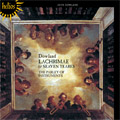 To
compose seven variations on the same rather mournful theme,
lasting over 20 minutes, followed by 14 other pieces in a similar
vein, without boring the listener is no mean feat, but Dowland,
with the assistance of The Parley of Instruments, brings it
off wonderfully. Melancholy was much in fashion in Dowland’s
day, and the mood in this music, as in many of the other shorter
pieces which conclude the programme, is in tune with the times.
Sir Henry Umptons Funerall, for example, is the musical
equivalent of a fascinating composite picture in the London
National Portrait Gallery, taking us from Umpton’s (or Unton’s)
birth, via his university career, his life in his country mansion,
complete with masque, his diplomacy and death abroad and finally,
taking up most of the picture, a cut-away view of the church
where his funeral is taking place.
To
compose seven variations on the same rather mournful theme,
lasting over 20 minutes, followed by 14 other pieces in a similar
vein, without boring the listener is no mean feat, but Dowland,
with the assistance of The Parley of Instruments, brings it
off wonderfully. Melancholy was much in fashion in Dowland’s
day, and the mood in this music, as in many of the other shorter
pieces which conclude the programme, is in tune with the times.
Sir Henry Umptons Funerall, for example, is the musical
equivalent of a fascinating composite picture in the London
National Portrait Gallery, taking us from Umpton’s (or Unton’s)
birth, via his university career, his life in his country mansion,
complete with masque, his diplomacy and death abroad and finally,
taking up most of the picture, a cut-away view of the church
where his funeral is taking place.
This Hyperion recording interrupts the progress of the 21 pieces
from the Lachrimae collection, with another composer’s
piece which Dowland ‘borrowed’ for his 1610 collection and two
alternative versions of pieces contained in Lachrimae.
A rival recording from the Dowland Consort directed by Jakob
Lindberg offers just the 21 pieces of the Lachrimae collection,
with the dance pieces in a different order from that adopted
on Hyperion. (BIS-CD-315 – download from passionato
in mp3 or flac). The Hyperion recording has always been reckoned
a good runner-up to that Bis version, but the reduction in price
which comes with its reissue makes it much more competitive.
In fact, I played it alongside my copy of the slightly smaller-scale
Lindberg recording – once briefly available under licence on
the short-lived Boots Classics label as The Elizabethan Collection
(which overlooks the fact that the Queen was dead by 1604) –
and found myself enjoying the Hyperion reissue, played by a
full consort, just as much.
The reissue comes with all the apparatus of the full-price original,
including Peter Holman’s notes, which may be supplemented by
reading his 1999 study, published by Cambridge University Press.
There is another download rival, from the Norwegian Baroque
Orchestra on Linn CKD194, available here
in mp3 and lossless sound or as a stereo hybrid SACD. This offers
just the seven pavans, with six interspersed lute songs, performed
by Randi Stene (mezzo) and Rolf Lislevand (lute) and with Lachrimae
antiquae repeated at the end. It’s a good effort from a
group which had probably had little experience of playing Dowland
– the quotation from the Norwegian review on the Linn website
makes the point: Dowland er ikke så kjent her hjemme,
Dowland is not so well known here [in Norway] – but it’s not
competitive with the BIS and Hyperion, especially as it plays
for just 48 minutes.
Claudio MONTEVERDI (1567-1643)
L’incoronazione di Poppea (1642/3)
Sylvia McNair (soprano) - Poppea; Dana Hanchard (soprano) -
Nerone; Anne Sofie von Otter (mezzo) - Ottavia, Fortune, Venus;
Michael Chance (alto) - Ottone; Francesco Ellero d’Artegna (bass)
- Seneca; Catherine Bott (soprano) - Drusilla, Virtue, Pallas
Athene; Roberto Balcone (alto) - Nurse; Bernarda Fink (alto)
- Arnalta; Mark Tucker (tenor) - Lucano, First Soldier; Julian
Clarkson (bass) - Lictor, Mercury; Marinella Pennicchi (soprano)
- Love; Constanze Backes (soprano) - Valleto; Nigel Robson (tenor)
- Liberto, Second Soldier; English Baroque Soloists/John Eliot
Gardiner. -rec. live, Queen Elizabeth Hall, London, December
1993. DDD.
DG ARCHIV 447 088-2 [3 CDs: 71:35 + 76:01 + 43:00] –
from passionato
(mp3)
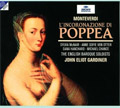 I
seem to be going through a phase at the moment of trying alternative
performances of operas which I have never quite come to terms
with. Poppea is one such: I love Orfeo and Ritorno
d’Ulisse, but have found it hard to warm to the third
Monteverdi opera. It can't be because the authorship of the
music is in doubt, or that Monteverdi re-used the music from
Ulisse in the Prologue – he recycled the opening Sinfonia
of the 1610 Vespers in Orfeo and that doesn’t
put me off either masterpiece. Nor do I think it the fault of
my having listened only to the Harnoncourt recording: I know
that his orchestration is a trifle over-lush, but so is his
Ulisse and I got to know that work via the Harnoncourt
LPs. Nevertheless, Gardiner’s version is more to my liking,
with its minimum intervention, strong cast and fine recording,
to which the mp3 transfer does justice.
I
seem to be going through a phase at the moment of trying alternative
performances of operas which I have never quite come to terms
with. Poppea is one such: I love Orfeo and Ritorno
d’Ulisse, but have found it hard to warm to the third
Monteverdi opera. It can't be because the authorship of the
music is in doubt, or that Monteverdi re-used the music from
Ulisse in the Prologue – he recycled the opening Sinfonia
of the 1610 Vespers in Orfeo and that doesn’t
put me off either masterpiece. Nor do I think it the fault of
my having listened only to the Harnoncourt recording: I know
that his orchestration is a trifle over-lush, but so is his
Ulisse and I got to know that work via the Harnoncourt
LPs. Nevertheless, Gardiner’s version is more to my liking,
with its minimum intervention, strong cast and fine recording,
to which the mp3 transfer does justice.
I haven’t yet heard the new Glossa recording (La Venexiana/Claudio
Cavina, GCD920916), which has received some mixed reviews –
always an incentive to investigate – but I think it’s Gardiner
that I shall be staying with. Passionato don’t offer a libretto
– the greyed-out reference on the webpage suggests that they
may intend to do so in the future – but synopses and the Italian
text are readily available online. Passionato also have the
Glossa but, at £23.99 (mp3) or £28.99 (lossless), that’s more
expensive than the Gardiner at its regular price of £17.99 (on
special offer at £13.99 as I write) and more than most dealers
are charging for the Glossa CDs.
Orlando GIBBONS (1583-1625)
Almighty and everlasting God; O Lord in thy wisdom; Hosanna
to the Son of David; O Lord increase my faith; O clap your hands,
God is gone up.
Choir of King’s College, Cambridge/Boris Ord – rec. 1954. Mono/ADD
BEULAH EXTRA 1BX20 [17:28] – from Beulah
(mp3)
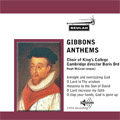 This
is worth having for the sake of hearing what King’s College
Choir could do even before the reforming hand of David Willcocks
was laid upon it. It’s all too easy with the benefit of hindsight
to regard the pre-Willcocks period as a kind of prehistoric
time, but Boris Ord’s championship of Gibbons on this recording,
when his music was far from well known, is well worth hearing.
The recording requires a degree of tolerance but the quality
of the performance shines through, offering a fascinating comparison
with the latter-day King’s choir under Stephen Cleobury in 2007
in music by Gibbons, Weelkes and Tomkins which I reviewed in
tandem with a Gimell recording of Tomkins in my recent survey
of The Tallis Scholars at 30 (EMI 3944302 – review here.
See also review
by Miguel Muelle).
This
is worth having for the sake of hearing what King’s College
Choir could do even before the reforming hand of David Willcocks
was laid upon it. It’s all too easy with the benefit of hindsight
to regard the pre-Willcocks period as a kind of prehistoric
time, but Boris Ord’s championship of Gibbons on this recording,
when his music was far from well known, is well worth hearing.
The recording requires a degree of tolerance but the quality
of the performance shines through, offering a fascinating comparison
with the latter-day King’s choir under Stephen Cleobury in 2007
in music by Gibbons, Weelkes and Tomkins which I reviewed in
tandem with a Gimell recording of Tomkins in my recent survey
of The Tallis Scholars at 30 (EMI 3944302 – review here.
See also review
by Miguel Muelle).
The Nightingale and The Butterfly
Louis Caix D’HERVELOIS (1680–1759)
Deuxième Suite in G [13:55]
Robert de VISÉE (c.1650–1725)
Passacaille (MS Vaudry de Saizenay: late 17th century)
[2:41]
Anne-Danican PHILIDOR (1681–1728)
Sonate pour la flûte à bec in d minor
[8:58]
Charles DIEUPART (c.1667–c.1740)
Suite No.1 in A pour une flûte de voix [16:31]
Robert de VISÉE Suite
in d minor (MS Vaudry de Saizenay: late 17th century) [11:17]
François COUPERIN (1668–1733)
Troisième Livre de pièces de clavecin Quatorzième
Ordre : Le Rossignol-en-amour (Lentement,et très
tendrement, quoy que mesuré) [3:22]
Charles DIEUPART Suite No.6
in f minor ‘pour une flûte du quatre’ [14:14]
François COUPERIN Troisième
Livre de pièces de clavecin Quatorzième Ordre :
Le Rossignol Vainqueur (Très Légèrement)
[2:00] ; Double du Rossignol [3:33]
Pamela Thorby (recorders)/Elizabeth Kenny (lutes)
rec. The National Centre for Early Music, York, UK, 22-24 March,
2009. DDD
LINN RECORDS CKD341 [76:39] – from Linn
(mp3, lossless and Studio Master)
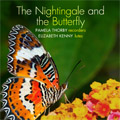 The
surviving repertoire of music for the recorder from baroque
French composers is, as Pamela Thorby reminds us in the notes,
small in volume but high in quality. Everything here is utterly
inconsequential and totally charming. The performances strike
exactly the right note: a great deal of scholarly thought has
gone into the selection of appropriate instruments alone, as
can be seen from the list which I have appended, but you would
never guess that from the absolute spontaneity of the playing.
With first-rate recording and informative notes, this is an
excellent successor to Thorby’s earlier recordings for Linn.
I chose the CD-quality wma version: my only complaint is that,
unfortunately, Linn’s 24-bit recordings come at too high a sample
rate for Squeezebox. Gimell are more flexible in that they offer
24-bit downloads at 44.1 kHz as well as 88.2 or 96 kHz.
The
surviving repertoire of music for the recorder from baroque
French composers is, as Pamela Thorby reminds us in the notes,
small in volume but high in quality. Everything here is utterly
inconsequential and totally charming. The performances strike
exactly the right note: a great deal of scholarly thought has
gone into the selection of appropriate instruments alone, as
can be seen from the list which I have appended, but you would
never guess that from the absolute spontaneity of the playing.
With first-rate recording and informative notes, this is an
excellent successor to Thorby’s earlier recordings for Linn.
I chose the CD-quality wma version: my only complaint is that,
unfortunately, Linn’s 24-bit recordings come at too high a sample
rate for Squeezebox. Gimell are more flexible in that they offer
24-bit downloads at 44.1 kHz as well as 88.2 or 96 kHz.
The pitch employed for the recording was A=415. The following
instruments were employed:Caix d’Hervelois - ‘Terton’ soprano
recorder in C by Yuzuru Fukushima (1996); archlute after Venere
byMartin Haycock (1998)
de Visée - theorbo after Italian originals by Klaus Jacobsen
(1994)
Philidor - ‘Bressan’ alto recorder in F by Fred Morgan (1992);
theorbo after Italian originals by Klaus Jacobsen (1994)
Dieupart (Suite No.1) - voice flute (tenor recorder in D) by
Fred Morgan (1992); theorbo after Italian originals by Klaus
Jacobsen (1994)
Couperin - voice flute (tenor recorder in D) by Fred Morgan
(1992) and sopranino recorder by Yuzuru Fukushima (2000); 5
course baroque guitar based on Venetian model by Klaus Jacobsen
(1995)
Dieupart (Suite No.6) - ‘Bressan’ fourth flute (soprano recorder
in B-flat) by Tim Cranmore (2008); archlute after Venere by
Martin Haycock
Antonio VIVALDI (1678-1741)
Concerto in C for two oboes, two clarinets and strings, RV560
[9:18]
Tomaso ALBINONI (1671-1751)
Concerto in G for two oboes, Op 9/6 [9:12]
Antonio VIVALDI Oboe Concerto
in F, RV455 [9:34]
Tomaso ALBINONI Concerto
in C for trumpet, three oboes, bassoon and continuo [8:44];
Oboe Concerto in d minor Op 9/2 [11:02]; Concerto in C for two
oboes Op 9/9 [10:17]
Antonio VIVALDI Concerto
in C for two oboes, two clarinets and strings RV559 [10:40]
Paul Goodwin (oboe); The King’s Consort/Robert King
rec. January 1990, Rosslyn Hill Chapel, London. DDD.
HYPERION HELIOS CDH55349 [69:33] – from Hyperion
(mp3 and lossless)
- See review by Jonathan Woolf - here.
Tomaso ALBINONI
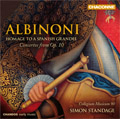 Homage
to a Spanish Grandee: Selection from Concerti a cinque,
Op.10 (Nos.1-3, 5, 7-8 and 11-12) Concerto primo in B-flat
[6:34]; Concerto secondo in g minor [10:00]; Concerto
terzo [8:11]; Concerto quinto [8:15]; Concerto
settimo [9:03]; Concerto ottavo [9:25]; Concerto
undicesimo [7:17]; Concerto dodicesimo [9:48]
Homage
to a Spanish Grandee: Selection from Concerti a cinque,
Op.10 (Nos.1-3, 5, 7-8 and 11-12) Concerto primo in B-flat
[6:34]; Concerto secondo in g minor [10:00]; Concerto
terzo [8:11]; Concerto quinto [8:15]; Concerto
settimo [9:03]; Concerto ottavo [9:25]; Concerto
undicesimo [7:17]; Concerto dodicesimo [9:48]
Collegium Musicum 90/Simon Standage
rec. St Jude on the Hill, Hampstead, London, November 2009.
DDD.
CHANDOS CHAN0769 [68:29] – from theclassicalshop
(mp3 and lossless)
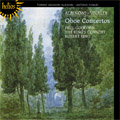 The
Hyperion budget-price issue is likely to whet your appetite
for more Albinoni, such as the Chandos where Collegium Musicum
90 offer yet another fine recording to add to their already
impressive list of Albinoni albums, this time containing eight
of the Op.10 concertos. I recommended their recording of Op.7/3,
6, 9 and 12 and Op.9/2, 5, 8 and 11 on CHAN0579 in July
2009 – see review
– and in February 2010 I listed the other albums so far available:
The
Hyperion budget-price issue is likely to whet your appetite
for more Albinoni, such as the Chandos where Collegium Musicum
90 offer yet another fine recording to add to their already
impressive list of Albinoni albums, this time containing eight
of the Op.10 concertos. I recommended their recording of Op.7/3,
6, 9 and 12 and Op.9/2, 5, 8 and 11 on CHAN0579 in July
2009 – see review
– and in February 2010 I listed the other albums so far available:
12 Concerti a cinque, Op.5: CHAN0663
- theclassicalshop
or passionato
or classicsonline
Op.7/1, 2, 4 & 5; Op.9/1, 3, 4 & 6;
Sinfonia in g minor: CHAN0602 - theclassicalshop
or passionato
or classicsonline
Op.7/7, 8, 10 & 11; Op.9/7, 9, 10 &12:
CHAN0610 - theclassicalshop
or passionato
or classicsonline
That means that, by my reckoning, one more CD will complete
the run of Opp.5, 7, 9 and 10. May we have it soon, please?
Passionato also have the download of the Albrecht Mayer recording
of Venetian oboe concertos (Albinoni, Vivaldi, etc., Decca 478
0313, Albrecht Mayer in Venice) which I reviewed some
time ago – see review.
Johann Sebastian BACH
(1685-1750)
Mass in b minor, BWV232 (1748-50, ed. Joshua Rifkin, 2006)
Susan Hamilton, Cecilia Osmond (sopranos); Margot Oitzinger
(alto); Thomas Hobbs (tenor); Matthew Brook (bass); Dunedin
Consort and Players/John Butt
rec. Greyfriars Kirk, Edinburgh, 13-17 September, 2009. DDD.
LINN RECORDS CKD354 [2 CDs: 102:09] – from Linn
(mp3, lossless and 24-bit Studio Master)
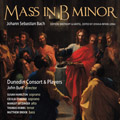 As
might have been expected, since it uses the Rifkin edition,
this recording has already divided critical opinion: for some
reviewers it has been the best thing since sliced bread – there
already were eleven positive reviews on the Linn website when
I downloaded the recording – but others have been left cold.
I’ll come clean at once, for the benefit of those who dislike
long reviews which list the pros and cons and sit on the fence,
and say that parts of this new recording knocked me out, that
it will certainly be a version of the work to which I shall
return frequently, but that ultimately I shall not be throwing
out John Eliot Gardiner’s now classic DG Archiv version.
As
might have been expected, since it uses the Rifkin edition,
this recording has already divided critical opinion: for some
reviewers it has been the best thing since sliced bread – there
already were eleven positive reviews on the Linn website when
I downloaded the recording – but others have been left cold.
I’ll come clean at once, for the benefit of those who dislike
long reviews which list the pros and cons and sit on the fence,
and say that parts of this new recording knocked me out, that
it will certainly be a version of the work to which I shall
return frequently, but that ultimately I shall not be throwing
out John Eliot Gardiner’s now classic DG Archiv version.
I’m not partisan on the vexed issue of whether Bach envisaged
one voice to a part or many, especially as it is likely that
he never heard the b-minor Mass in toto, except in his
head. If the practice works, as it certainly does on a number
of cantata recordings which I have heard – I’m thinking especially
of Rifkin’s recording of six cantatas on mid-price Double Decca
458 0972 and a further six on 455 7062 – it’s fine by me.
There are some marginally less than secure moments – the tenor
at the start of Credo in unum Deum, for example – and,
inevitably, the soloists are sometimes hard pressed to be heard
above the orchestra, but, by and large, the singing is a delight.
With sensitive playing from the smallish ensemble, the vocal
swamping is minimal; in fact, as with the Alpha recording of
Beethoven below, the small forces actually achieve a larger
sound than usual, thanks to the intimate (but not over-close)
recording. I can’t imagine that the SACDs and the Studio Master
downloads add much to the quality of the very good CD-quality
wma version. John Butt’s notes are a delight – scholarly, as
befits someone whose Ph.D. was on this very work, but comprehensible
for the reasonably well-informed lay-person.
The Linn recording comes at mid price (£15 on two SACDs, £10
for the wma download), but Gardiner is also available at a very
attractive price, with the two Passions and the Christmas
Oratorio on a 9-CD Collector’s Edition set. The 2-CD set
of the Mass is available for £12.99 from passionato
and the box set for £27.99, again from passionato.
(Both were on offer even less expensively when I checked). There
is also a 22-CD limited edition set of Bach’s Sacred Masterpieces
on 477 8735 – not available to download but at a very attractive
price of around £45 in the UK.
(Giuseppe) Domenico SCARLATTI
(1685-1757)/arr. Vincenzo TOMMASINI
(1878-1950)
The Good Humoured Ladies – Ballet (1916/17) [14:55]
Paris Conservatoire Orchestra/Roger Désormière
– rec. 1950. Mono/ADD
BEULAH EXTRA 1BX17 [14:55] – from Beulah
(mp3)
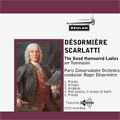 This
is something of a blast from the past – and I don’t just mean
the age of the recording. Concoctions like this used to be much
more popular: at one time, no primary school assembly could
start without ‘Sheep may safely graze’ from Walton’s arrangement
of Bach, The Wise Virgins. I don’t want to sound snooty,
though – I really enjoy this kind of confection and I was very
pleased to be reminded of this suite from Le Donne di buon
Umore, which began life as a skilful arrangement of sonatas
by Domenico Scarlatti for a Diaghilev ballet.
This
is something of a blast from the past – and I don’t just mean
the age of the recording. Concoctions like this used to be much
more popular: at one time, no primary school assembly could
start without ‘Sheep may safely graze’ from Walton’s arrangement
of Bach, The Wise Virgins. I don’t want to sound snooty,
though – I really enjoy this kind of confection and I was very
pleased to be reminded of this suite from Le Donne di buon
Umore, which began life as a skilful arrangement of sonatas
by Domenico Scarlatti for a Diaghilev ballet.
The performance has the kind of panache that is needed in order
to bring off the blend of old and new and the recording is still
quite acceptable, if a little thin. A friend recently remarked
that about 1954 was a sort of watershed for sound that doesn’t
remind the listener too much of its age. This is noticeably
a little earlier than that watershed, but it’s well worth the
modest asking price. In any case, the only rivals in the current
catalogue appear to be a Testament CD transfer of the same Désormière
performance, coupled with Ibert’s Divertissement, etc.
(SBT1309) and another Testament CD with the Philharmonia and
Igor Markevich (SBT1105).
Joseph HAYDN (1732-1809)
String Quartets: No.23 in f minor, Op.20/5 [21:04]; in F, Op.3/3
[13:37]; No.32 in d minor, Op.42 [13:42]
Allegri String Quartet – rec. by Westminster, 1969. ADD.
- from HDTT
(24bit/96kHz flac download)
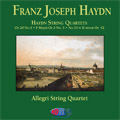 Vintage
performances from early in the career of the Allegri Quartet,
very well transferred and well worth obtaining. This is one
of two High Density Tape Transfer recordings in this month’s
Download Roundup; in addition there are four reviews of Musicweb
International downloads of Nimbus recordings which are being
hosted by HDTT. Having purchased a particular recording, you
will receive an email containing the download link. Make sure
that you type your email address very carefully and retain the
email in case, for any reason, you have to download a track
again – once or twice, for whatever reason, a download terminated
early, but it was very easy to retry.
Vintage
performances from early in the career of the Allegri Quartet,
very well transferred and well worth obtaining. This is one
of two High Density Tape Transfer recordings in this month’s
Download Roundup; in addition there are four reviews of Musicweb
International downloads of Nimbus recordings which are being
hosted by HDTT. Having purchased a particular recording, you
will receive an email containing the download link. Make sure
that you type your email address very carefully and retain the
email in case, for any reason, you have to download a track
again – once or twice, for whatever reason, a download terminated
early, but it was very easy to retry.
The download comes with some general notes about Haydn, but
you wouldn’t know from these that Haydn’s Op.3 quartets have
for some time been attributed to Roman Hofstetter. The one here
is fairly small beer but attractive and the other two quartets,
especially No.32, come from Haydn’s productive middle period.
Wolfgang Amadeus MOZART
(1756-1791)
Le Nozze di Figaro, K492 (1786)
Giuseppe Taddei (baritone) - Figaro; Elisabeth Schwarzkopf (soprano)
- Countess; Anna Moffo (soprano) - Susanna; Eberhard Wächter
(baritone) - Count; Fiorenza Cossotto (mezzo) - Cherubino; Dora
Gatta (soprano) - Marcellina ; Piero Cappucilli (bass)
- Antonio; Philharmonia Orchestra/Carlo Maria Giulini – rec.
1959. ADD.
EMI CLASSICS 3586022 [2 CDs: 153 minutes] – from passionato
(mp3 or lossless)
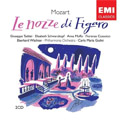 This
recording features in the MusicWeb International list of Classic
Classics – how could it not? So much praise has
been poured on it that there is almost nothing worth saying,
except that it is currently deleted on CD, so the only way to
obtain it is via download. No doubt it will reappear soon in
another guise on CD; meanwhile, whatever other version of Figaro
you have, even the Decca/Kleiber which I also strongly recommend
– not just because it’s more complete than the Giulini – you
must have this, too, even though the download is more expensive
than the CDs when they were last available. There’s no libretto,
translation or synopsis, but these are easily obtainable, including
from EMI here.
This
recording features in the MusicWeb International list of Classic
Classics – how could it not? So much praise has
been poured on it that there is almost nothing worth saying,
except that it is currently deleted on CD, so the only way to
obtain it is via download. No doubt it will reappear soon in
another guise on CD; meanwhile, whatever other version of Figaro
you have, even the Decca/Kleiber which I also strongly recommend
– not just because it’s more complete than the Giulini – you
must have this, too, even though the download is more expensive
than the CDs when they were last available. There’s no libretto,
translation or synopsis, but these are easily obtainable, including
from EMI here.
Ludwig van BEETHOVEN
(1770-1827)
Piano Concerto No.1 in C, Op.15 [34:02]; Piano Concerto No.2
in B-flat, Op.19 [25:29]
Ensemble Cristofori/Arthur Schoonderwoerd (fortepiano) – rec.
May, 2008. DDD.
ALPHA 155 [59:31] from emusic
(mp3)
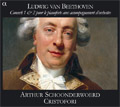 These
are revelatory performances, akin to seeing a familiar painting
when it has been restored. Some of it will seem too bright for
some tastes, but the overall impact is thrilling and the whole
may be strongly recommended, even to those who normally steer
clear of ‘authenticity’ in general and the fortepiano in particular.
I haven’t enjoyed hearing these concertos so much since I first
heard the Kempff recordings on DG. Somehow, paradoxically, the
small ensemble makes the music sound larger. I shall still listen
to Stephen Kovacevich and Colin Davis (Philips) and I must reacquaint
myself with those Kempff recordings, but I suspect that I shall
also be returning to Schoonderwoerd pretty frequently. The mp3
transfer is good – most of the tracks are at 256k or 320k. Now
I must search out the two earlier recordings in the series –
somehow they have passed me (and MWI) by unnoticed.
These
are revelatory performances, akin to seeing a familiar painting
when it has been restored. Some of it will seem too bright for
some tastes, but the overall impact is thrilling and the whole
may be strongly recommended, even to those who normally steer
clear of ‘authenticity’ in general and the fortepiano in particular.
I haven’t enjoyed hearing these concertos so much since I first
heard the Kempff recordings on DG. Somehow, paradoxically, the
small ensemble makes the music sound larger. I shall still listen
to Stephen Kovacevich and Colin Davis (Philips) and I must reacquaint
myself with those Kempff recordings, but I suspect that I shall
also be returning to Schoonderwoerd pretty frequently. The mp3
transfer is good – most of the tracks are at 256k or 320k. Now
I must search out the two earlier recordings in the series –
somehow they have passed me (and MWI) by unnoticed.
Piano Sonata No.29 in B-flat, Op.106 (‘Hammerklavier’) [43:33]
Piano Sonata No.28 in A, Op.101 [21:00]
Vladimir Feltsman (piano)
rec. The American Academy of Arts and Letters, New York City,
11-13 August 1997. DDD
NIMBUS NI2561 [64:33] – from HDTT/Musicweb
(CD quality flac)
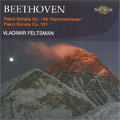 I
like late Beethoven Quartets and Sonatas to sound as if hewn
from solid granite and this recording, now finding a new home
from MusicMasters, largely qualifies. If anything, the playing
is just a little too wayward and uncontrolled – but those are
epithets that his contemporaries applied to Beethoven’s late
works and which still often seem apt. Felstman’s Beethoven divides
opinion almost equally: I’m sure that this recording will also
do that. As a typical Gemini, I shall sometimes make this part
of my listening experience, but at other times I want something
a little less extreme – Stephen Kovacevich, perhaps.
I
like late Beethoven Quartets and Sonatas to sound as if hewn
from solid granite and this recording, now finding a new home
from MusicMasters, largely qualifies. If anything, the playing
is just a little too wayward and uncontrolled – but those are
epithets that his contemporaries applied to Beethoven’s late
works and which still often seem apt. Felstman’s Beethoven divides
opinion almost equally: I’m sure that this recording will also
do that. As a typical Gemini, I shall sometimes make this part
of my listening experience, but at other times I want something
a little less extreme – Stephen Kovacevich, perhaps.
The recording is close and clear and comes in CD-quality flac
sound, with no mp3 alternative – mp3 player users will be able
to convert using a programme such as Roxio Copy and Convert.
The purchase comes with an informative pdf booklet. I initially
had problems with tracks 5 and 6 – in both cases my download
manager cut them off short. This happened with some other HDTT
downloads, but it’s easy to access the tracks and download again:
second time lucky in both cases. Don’t delete the email which
takes you to the downloads till you are certain that every track
has downloaded completely.
The Romantic Generation
Fryderyk CHOPIN (1810-1849)
Nocturne in B, Op.62 No.1 [6:23]
Ferenc LISZT (1811-1886)
Reminiscences of Don Juan [18:19]; Die Loreley
[5:59]
CHOPIN Nocturne in D-flat,
Op.27 No.2 [5:05]
CHOPIN/LISZT My Joys [3:44]
Robert SCHUMANN(1810-1856)
Davidsbündlertänze, Op.6 [33:44]
Charles Rosen (piano)
rec. American Academy of Arts & Letters, New York, June
to October 1993. DDD.
NIMBUS NI2559 [73:14] – from HDTT/Musicweb
(CD quality flac)
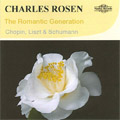 That
this, another refugee from MusicMasters, should find a new home
at Nimbus in the Chopin and Schumann anniversary year, with
Liszt’s turn to come next year, seems very appropriate. A spin-off
from Rosen’s book The Romantic Generation, it offers
a fine introduction to the piano music of the period. The playing
is better than reliable throughout, with plenty of nimble finger-work,
if a little cool in places – the treatment lends itself best
to the Liszt Reminiscences of Don Juan. The one unfamiliar
work, My Joys started life as a Chopin Mazurka, but Liszt
transformed it into a Nocturne.
That
this, another refugee from MusicMasters, should find a new home
at Nimbus in the Chopin and Schumann anniversary year, with
Liszt’s turn to come next year, seems very appropriate. A spin-off
from Rosen’s book The Romantic Generation, it offers
a fine introduction to the piano music of the period. The playing
is better than reliable throughout, with plenty of nimble finger-work,
if a little cool in places – the treatment lends itself best
to the Liszt Reminiscences of Don Juan. The one unfamiliar
work, My Joys started life as a Chopin Mazurka, but Liszt
transformed it into a Nocturne.
The recording is good, the transfer does it justice, and there
is a very brief but useful booklet of notes to be downloaded
as a pdf (Adobe Reader) document. The files come in zipped format
to save download time.
Richard WAGNER (1813-1883) Lohengrin
(1848) [217:17]
Lohengrin – Jess Thomas (tenor); Elsa von Brabant – Elisabeth
Grümmer (soprano); Ortrud – Christa Ludwig (mezzo); Friedrich
von Telramund – Dietrich Fischer-Dieskau (baritone); King Heinrich
– Gottlob Frick (bass); Herald – Otto Wiener (baritone);
Chor der Wiener Staatsoper
Vienna Philharmonic Orchestra/Rudolf Kempe - rec. 1962-3, Theater
an der Wien, Vienna
EMI CLASSICS 5674152 [3 CDs: 72:02 + 77:10 + 68:05] –
from passionato
(mp3)
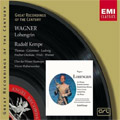 Only
last month I declared myself resolved to tackle Lohengrin,
the last Wagner opera that has so far eluded me – apart from
Rienzi, that is – when the Kempe reissue fell, as it
were, into my lap and reconciled me to an opera with which I
have been able only partly to engage in the Solti recording.
Actually, it’s not the newest version (EMI CLASSICS 4 56465
2 – see review)
that I wish to commend as a download but the previous reincarnation
of the same 2000 digitisation. As Simon Thompson says in his
review of the latest reissue, there is no reason to hesitate.
The lossless download is good and there is a slightly less expensive
mp3. No libretto, of course, but that’s easily available online,
and even with the new release you have to print it out from
the CD-ROM.
Only
last month I declared myself resolved to tackle Lohengrin,
the last Wagner opera that has so far eluded me – apart from
Rienzi, that is – when the Kempe reissue fell, as it
were, into my lap and reconciled me to an opera with which I
have been able only partly to engage in the Solti recording.
Actually, it’s not the newest version (EMI CLASSICS 4 56465
2 – see review)
that I wish to commend as a download but the previous reincarnation
of the same 2000 digitisation. As Simon Thompson says in his
review of the latest reissue, there is no reason to hesitate.
The lossless download is good and there is a slightly less expensive
mp3. No libretto, of course, but that’s easily available online,
and even with the new release you have to print it out from
the CD-ROM.
Passionato have two versions of this recording, one with the
UK catalogue number and Nipper on the cover, the other with
the US recording angel – it’s the number of this that I give
and recommend, as I have occasionally found small flaws on UK-derived
EMI downloads which were not present on the US equivalent. If
you are prepared to compromise a little and accept 256k mp3
sound, Amazon have the new release, complete with digital booklet,
for an incredible £11.49.
Giuseppe VERDI (1813-1903)
Aïda
Maria Callas (soprano) - Aïda; Fedora Barbieri (mezzo)
- Amneris; Tito Gobbi (baritone) - Amonasro; Richard Tucker
(tenor) - Radames; La Scala, Milan Chorus and Orchestra/Tullio
Serafin – rec. August, 1955. Mono/ADD (NB : the EMI CDs
are not currently available).
EMI CLASSICS 5563162 [143:58] – download only from passionato
(mp3)
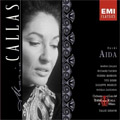 The
rather unsatisfactory Aïda, recently shown on BBC4,
drove me back to seek a download recording to recommend and
to this Callas-Barbieri-Gobbi-La Scala/Serafin version in particular,
despite the reservations which I always feel on hearing Callas.
Reviewing the 70-CD complete Callas studio recordings – no longer
available – Robert J Farr also had some reservations:
The
rather unsatisfactory Aïda, recently shown on BBC4,
drove me back to seek a download recording to recommend and
to this Callas-Barbieri-Gobbi-La Scala/Serafin version in particular,
despite the reservations which I always feel on hearing Callas.
Reviewing the 70-CD complete Callas studio recordings – no longer
available – Robert J Farr also had some reservations:
... her performance is vocally varied. In my review
of the Naxos remastering, I note her lack of vocal security
in O patria mio while acknowledging her better Ritorna
Vincitor and enjoying the visceral excitement and drama
of her confrontation with Barbieri’s Amneris in Fu la sorte
dell’armi and with Gobbi’s Amonasro in the Nile scene. Richard
Tucker is a robust Radames. (See review).
I must admit, however, that on this occasion I was pretty convincingly
won over – not just by Callas but by all concerned. The mono
recording and the mp3 transcription are in no way serious hazards
to the enjoyment of this set. Apart from the Naxos and Regis
sets, both made from LPs rather than the master tapes, the download
is currently the only way to obtain this recording. The Naxos
transfer is available from classicsonline – here
– marginally less expensively than the passionato/EMI; they
also have two versions of the Documents reissue of Callas’s
1951 recording.
Antonín DVOŘÁK
(1841-1904)
Symphony No.7 in d minor, Op.70/B141 [37:04]
Symphony No.8 in G, Op.88/B163 [37:17]
Baltimore Symphony Orchestra/Marin Alsop – rec. January 2008
and March, 2009. DDD
NAXOS 8.572112 [74:20] – from classicsonline
(mp3)
Symphony No.9 in e minor, Op.95/B178 (‘New World’) [41:03]
Symphony No.8 in G, Op.88/B163 [36:57]
Budapest Festival Orchestra/Iván Fischer – rec. February-March,
2000. DDD
PHILIPS 464 6402 [78:01] – from passionato
(mp3) or CHANNEL CLASSICS Hybrid SACD CCSSA90110
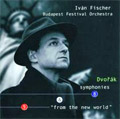 Since
I recommended the Naxos/Marin Alsop recording last month on
the basis of a first hearing, I’ve been listening to the Eighth
Symphony again and comparing it with the versions by Rafael
Kubelík (DG Originals 447 4122) and Iván Fischer,
both coupled with the Ninth. Both, I think, have a slight edge
on the Naxos – good as Alsop and the Baltimore players are,
her rivals sound just a little more idiomatic. John Quinn rightly
thought the Fischer among the best versions of both symphonies
– see review.
Fischer takes more risks with tempi than Alsop, but they always
seem to come off well.
Since
I recommended the Naxos/Marin Alsop recording last month on
the basis of a first hearing, I’ve been listening to the Eighth
Symphony again and comparing it with the versions by Rafael
Kubelík (DG Originals 447 4122) and Iván Fischer,
both coupled with the Ninth. Both, I think, have a slight edge
on the Naxos – good as Alsop and the Baltimore players are,
her rivals sound just a little more idiomatic. John Quinn rightly
thought the Fischer among the best versions of both symphonies
– see review.
Fischer takes more risks with tempi than Alsop, but they always
seem to come off well.
The Naxos has a price advantage and I don’t think that you would
regret buying it, but the DG and Philips downloads are worth
that little extra. If you want the Fischer version in all its
SACD glory, it has just commuted from the Universal stable to
Channel Classics, still at full price.
Going for the Fischer or the Kubelík leaves you without
a Seventh: I’d recommend Jirí Bělohlávek
with the Czech Philharmonic on Chandos CHAN9391, coupled
with the Nocturne in b minor and Vodnik
(The Water Goblin), from theclassicalshop, here
(mp3 or lossless).
Gustav MAHLER (1860-1911)
Symphony No. 4 in G major (1892, 1899-1900; revised 1910) [56:41]
Miah Persson (soprano); Budapest Festival Orchestra/Iván
Fischer
rec. Palace of Arts, Budapest, Hungary, September 2008
CHANNEL CLASSICS CCSSA 26109 [56:41] – from emusic
(mp3)
Heidi Grant Murphy (soprano);New York Philharmonic Orchestra/Lorin
Maazel
NYPO DOWNLOADS [63:34] – from emusic
(mp3)
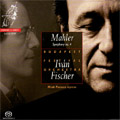 Leslie
Wright made the Fischer his Recording of the Month: “The bottom
line is that this new version of Mahler’s Fourth is now the
one to beat... look no further for your Mahler 4.” – see review.
It was, therefore, with considerable expectation that I downloaded
the recording from emusic – just four tracks, potentially less
than £1.
Leslie
Wright made the Fischer his Recording of the Month: “The bottom
line is that this new version of Mahler’s Fourth is now the
one to beat... look no further for your Mahler 4.” – see review.
It was, therefore, with considerable expectation that I downloaded
the recording from emusic – just four tracks, potentially less
than £1.
I’m sorry to say that I was disappointed – and largely for the
same reason that LW liked it: far from feeling that the rubato
was “part and parcel of the work”, I thought it was as artificially
applied as LW found it in Fischer’s Brahms. In Mahler he just
seems to me to be trying too hard, especially in the opening
movement, to be different: the ‘sleigh bells’ at the opening,
for example, are rendered inaudible by the engineers, perhaps
at Fischer’s behest. I agree with LW on many other issues: the
excellence of the playing and the recording, even as a download
and we share a high regard for the 1966 George Szell recording,
despite the somewhat matronly tones of Judith Raskin. Miah Persson
on the new recording sounds just right.
After the first movement, I felt more in tune with Fischer’s
view of the work, but ultimately it’s that Szell recording that
I come back to, currently on Sony Essential Classics at super-budget
price (SBK46535): CD only – I can’t find it listed on any download
site and, in any case, at around £5 in the UK, it’s very inexpensive
and the recording has worn really well. It’s also (I think)
the only current version with a coupling, added to it since
the CBS Maestro release which I own.
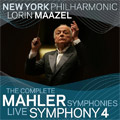 If
I was disappointed with the Fischer, I need a stronger word
to express my reaction to the NYPO download with Lorin Maazel
at the helm – a conductor whom I have usually found to be more
than reliable, but his first movement of Mahler 4 was enough
to put me off completely – it’s too slow overall but the rubato
which he applies from time to time means that it almost grinds
to a halt. I know that the score says Bedächtig,
nicht eilend – thoughtful, not hurried – but this really
is making haste too slowly: Eile mit Weile can be overdone
and the same is true of the other movements, too. It comes as
a surprise to find that Maazel’s first movement is only a few
seconds longer than Szell (18:02 against 17:25), it seems interminable;
the third movement is just too restfully Ruhevoll at
24:52 against Szell’s 20:52.
If
I was disappointed with the Fischer, I need a stronger word
to express my reaction to the NYPO download with Lorin Maazel
at the helm – a conductor whom I have usually found to be more
than reliable, but his first movement of Mahler 4 was enough
to put me off completely – it’s too slow overall but the rubato
which he applies from time to time means that it almost grinds
to a halt. I know that the score says Bedächtig,
nicht eilend – thoughtful, not hurried – but this really
is making haste too slowly: Eile mit Weile can be overdone
and the same is true of the other movements, too. It comes as
a surprise to find that Maazel’s first movement is only a few
seconds longer than Szell (18:02 against 17:25), it seems interminable;
the third movement is just too restfully Ruhevoll at
24:52 against Szell’s 20:52.
Just to demonstrate how subjective reactions to music can be,
the emusic site contains two adulatory comments and the overall
consumer rating is close to the maximum. The NYPO website offers
the liner notes, including texts and translations, here,
which are absent from the emusic deal. The emusic download is
adequate for movements 1 and 2, but falls well below the minimum
192 kbps in the remaining movements.
Jean SIBELIUS (1865-1957)
Symphony No.5 in E-flat, Op.82 [30:07]; Karelia Suite, Op.111
[13:35]; The Swan of Tuonela* [8:34]
London Symphony Orchestra/Alexander Gibson; Morton Gould and
his Orchestra*
Rec. 1959? ADD. [51:46] - From HDDT
(24-bit/96kHz flac).
- See review by Classical
Editor
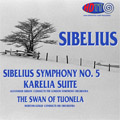 When
these Gibson recordings were released in 1960, he was hailed
as one of ‘our younger conductors’. He was to go on to make
several recommendable Sibelius recordings, latterly for the
Chandos label – his Fifth Symphony remains available, coupled
with the Second, at budget price on CHAN6556, download only
from theclassicalshop.net in mp3 and lossless – but these RCA
versions were never surpassed, especially as the LSO was then
on fine form. The Karelia Suite is played relatively
straight and objectively: even the alla marcia begins
without being given quite the degree of bounce that it might
have, so I was slightly disappointed, though things soon really
get under way at around 1:30.
When
these Gibson recordings were released in 1960, he was hailed
as one of ‘our younger conductors’. He was to go on to make
several recommendable Sibelius recordings, latterly for the
Chandos label – his Fifth Symphony remains available, coupled
with the Second, at budget price on CHAN6556, download only
from theclassicalshop.net in mp3 and lossless – but these RCA
versions were never surpassed, especially as the LSO was then
on fine form. The Karelia Suite is played relatively
straight and objectively: even the alla marcia begins
without being given quite the degree of bounce that it might
have, so I was slightly disappointed, though things soon really
get under way at around 1:30.
Gibson’s Fifth is very good: apart from a tendency to linger
a little too much at the end of the slow movement, I found it
free from interpretative quirks. That doesn’t mean that it’s
characterless – merely that he doesn’t try to force a subjective
view onto it. I cannot imagine that any listeners, whatever
their own personal likes and dislikes in this work, would find
anything seriously to object to. By comparison, Gould’s Swan
is merely a worthwhile bonus.
This was the first stereo account of the Fifth Symphony and
it has worn well. The transfers are little short of miraculous;
I doubt whether anyone heard the music sound this well in 1960,
on tape or LP. The bass sounds less than credible at times in
Swan of Tuonela, but otherwise you might almost think
that these were recent digital recordings.
Like all HDTT recordings, this comes complete with notes – in
this case, analysing the symphony only, in some detail, but
in minuscule print. I’d have welcomed larger print - also some
recording details, especially dates, and track timings – these
don’t display in Windows Explorer for flac recordings, though
they do for other formats, so I had to work them out tediously.
I have listed above the playing order which HDTT give for this
recording but, unless you add 01_, 02_, etc. at the beginning
of the track names, they will play in the order Karelia-Swan-Symphony,
which I actually preferred.
Sergei PROKOFIEV (1891-1953)
Six Pieces from the ballet Romeo and Juliet (1935) –
transcribed by Vadim Borisovsky [22:14]
Dmitri SHOSTAKOVICH (1906-1975)
Seven Preludes from Op.34 (1933) – transcribed by Vadim Borisovsky;
Nos.10, 14, 15, 16, 17, 18, 24 [10:26]; Viola Sonata Op.147
(1975) [31:36]
Robin Ireland (viola); Tim Horton (piano)
rec. July 2009, Potton Hall, Suffolk
NIMBUS NI6117 [65:30] – from HDTT/Musicweb
(CD quality flac)
- See review by Jonathan Woolf here.
[This review was added as a Postscript to the June Roundup]
This download represents the first fruits of collaboration between
MWI and High Definition Tape Transfers, initially of Nimbus
recordings with, it is hoped, other labels soon. The repertoire
may not be the most exciting – I thought the excerpts from Romeo
and Juliet inevitably rather pale when one recalls the orchestral
original – but the Shostakovich items, especially the Viola
Sonata, are well worth having in such dedicated performances.
There are, in fact, few rivals available as downloads – Nobuko
Imai and Roland Pontinen from BIS on passionato, coupled with
Rubinstein, Glinka, Glazunov and Stravinsky probably offer the
strongest of these.
The recording is good: I haven’t heard the CD, but I have no
doubt that this lossless (flac) transfer offers a true reflection.
iPod aficionados will be disappointed that there is no mp3 equivalent,
but the music plays very well in Squeezebox. At £8 ($11), it
offers good value: most websites, apart from Hyperion, offer
mp3 at around this price, with lossless usually a couple of
pounds more expensive. All in all, I rate this an encouraging
start.
Benjamin BRITTEN (1913-1973)
String Quartet No. 1 in D Major, Op. 25 (1941) [26:13]
String Quartet No. 2 in C Major, Op 36 (1945) [31:47]
String Quartet No. 3, Op. 94 (1975) [25:44]
Three Divertimenti for String Quartet (1936)
[10:31]
Belcea Quartet
rec. String Quartet No. 3, July 2003 and remaining works 28
June to 3 July 2004 at Potton Hall, Suffolk, UK. DDD.
EMI CLASSICS 5 57968 2 [58:10 + 36:24] - from passionato
(mp3 and lossless)
- See review by Michael Cookson (Recording of the Month)
– here.
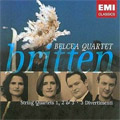 I
recommended the Brodsky Quartet recording of Quartets Nos. 2
and 3 in March 2009 – here
– but the Belcea Quartet are, if anything, even more recommendable
in those central quartets and they offer the complete numbered
cycle, plus the Three Divertimenti. Just one complaint
– as MC points out, there would have been room for one of the
unnumbered quartets. The download sound is good, even in mp3
format.
I
recommended the Brodsky Quartet recording of Quartets Nos. 2
and 3 in March 2009 – here
– but the Belcea Quartet are, if anything, even more recommendable
in those central quartets and they offer the complete numbered
cycle, plus the Three Divertimenti. Just one complaint
– as MC points out, there would have been room for one of the
unnumbered quartets. The download sound is good, even in mp3
format.
Minnesota Orchestra – Music on Demand
The Minnesota Orchestra is offering two of
its recent concert performances free of charge until October
2010 – hurry if you wish to take advantage. The two works are
Stravinsky’s Petrushka
[35:59]and Bruckner’s Seventh
Symphony [66:51], both conducted by Osmo Vänskä
and made available as 256kbps mp3 downloads from public broadcast
performances. Both are well worth hearing – the adagio
of the Bruckner perhaps just a little too languorous – and the
download sound is no hindrance to enjoyment. You will need to
submit your details here
in order to have the download details sent to your email address.
After November more concert recordings will be available to
purchase.
***
In Brief
Summertime - Music for Oboe & Guitar
Fernando SOR La Romanesca
[2:41]
Erik SATIE Gymnopédie
No. 1 [3:20]; Gnossienne No. 1 [2:39]
Johann KASPAR MERTZ Two
Bardenklänge Op.13 [6:56]
Heitor VILLA-LOBOSDistribuçao
de Flores [4:35]
George GERSHWINSummertime
[3:32]
Jacques IBERT Entr’acte
[3:09]
Johann Sebastian BACH Adagio,
from Toccata, Adagio and Fugue, BWV 564 (arr. Orphee) [3:02]
Napoleon COSTE Les Regrets
Op.36 [3:03]
Fernando SOR Marche Funèbre
pour Harpolyre [7:16]
Johann Baptist VANHAL Sechs
Variationen Op.42 [7:43]
John Anderson (oboe); Simon Wynberg (guitar) – rec. March 1983.
DDD.
CHANDOS COLLECT CHAN6581 [47:56] – from theclassicalshop
(mp3 and lossless)
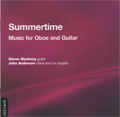 The
mp3 download of this CD was Chandos’s June 2010 gift to the
subscribers to their newsletter – well worth signing up for.
If you’re not on the list, the CD is worth its modest purchase
price for late-night listening on a Summer evening.
The
mp3 download of this CD was Chandos’s June 2010 gift to the
subscribers to their newsletter – well worth signing up for.
If you’re not on the list, the CD is worth its modest purchase
price for late-night listening on a Summer evening.
***
I haven’t had time this month for a really
detailed listen to and analysis of the following Beulah Extra
downloads, but they are all well worth exploring:
Johann STRAUSS II (1825-1899)
Gipsy Baron Overture
London Philharmonic Overture/Erich Kleiber – rec.1947. Mono.
ADD
BEULAH EXTRA 4BX6 [1:44] - from Beulah
(mp3)
Kleiber had a way with Viennese music, including both the Strauss
family and (the unrelated) Richard Strauss. You may also be
interested in Kleiber’s recording of Beethoven’s Pastoral
Symphony – follow the same link. Even for 1947, the sound
is somewhat restricted, though pleasantly free from 78 crackle.
Georges BIZET (1838-1875)
Carmen: Habañera; Seguidilla
Edith Coates (soprano); London Symphony Orchestra/Walter Goehr
– rec. 1948. Mono. ADD
BEULAH EXTRA 1BX21 [5:26] -from Beulah
(mp3)
Edith Coates’ Carmen may be a little fruity by modern standards
and it’s not usual to sing opera in English any more. This is
how I first heard Carmen, from the Carl Rosa company
– but the recording is of more than sentimental or historical
value and the sound is remarkably lifelike.
Wolfgang Amadeus MOZART (1756-1791)
Così fan tutte Overture
Berlin Staatsoper Orchestra/Leopold Ludwig – rec. 1938. Mono.
ADD.
BEULAH EXTRA 1BX4 [4:09] - from Beulah
(mp3)
A short but sweet reminder of Ludwig’s way with Mozart – I’d
like to hear more. The recording is inevitably lacking in frequency
range, but more than tolerable, with hardly any 78 surface noise.
Wolfgang Amadeus MOZART
Così fan tutte: per pieta, ben mio*
BEULAH EXTRA 2BX30 [6:56] – from Beulah
(mp3)
Bedřich
SMETANA (1824-1884) The Bartered Bride III: Our
Act of Love
Joan Cross (soprano); Dennis Brain (horn)*; Philharmonia Orchestra/Lawrance
Collingwood – rec. 1947. Mono. ADD
BEULAH EXTRA 1BX30 [4:36] - from Beulah
(mp3)
The recordings sound drier and more dated and with slightly
more surface noise than the Edith Coates recording (above) of
the same vintage and there are other, slightly later recordings
by which I prefer to remember Joan Cross – as the Housekeeper
in Britten’s Turn of the Screw, for example, on Decca
or in the form of a decent download from Past Classics. (See
April, 2009, Download
Roundup). Smetana is spelled as Smetena on the
cover [now being corrected by Beulah].
César FRANCK (1822-1890)
Pièce Héroïque
Édouard Commette (organ of Cathédrale Saint-Jean
de Lyon) – rec. 1938. Mono. ADD
BEULAH EXTRA 1BX9 [7:58] - from Beulah
(mp3)
The performance is powerful; if not definitive,
it is well worth hearing. The recording is a little cavernous,
but not impossibly so, and there is little or no 78 surface
noise.
Paul DUKAS (1865-1935) L’Apprenti
Sorcier (The Sorcerer’s Apprentice)
Israel Philharmonic Orchestra/Georg Solti – rec. 1958. Stereo.
ADD.
BEULAH EXTRA 1BX16 [9:48] – from Beulah
(mp3)
A vigorous performance in good, early stereo, well transferred.
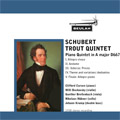 Some
interesting material is due to come from Beulah Extra in July,
of which, for me, the highlight is the Curzon recording of Schubert’s
Trout Quintet as 1BX41. Having recently bemoaned the fact
that this is no longer generally available separately, I suggested
that it would be very welcome – and here it is. If you have
noted the fact that I have used this as the benchmark for every
Trout that I have reviewed, you won’t even need to wait
for my review to download it when it becomes available.
Some
interesting material is due to come from Beulah Extra in July,
of which, for me, the highlight is the Curzon recording of Schubert’s
Trout Quintet as 1BX41. Having recently bemoaned the fact
that this is no longer generally available separately, I suggested
that it would be very welcome – and here it is. If you have
noted the fact that I have used this as the benchmark for every
Trout that I have reviewed, you won’t even need to wait
for my review to download it when it becomes available.
First Hearing/Discovery of the Month
Robert BEASER (b.1954)
Mountain Songs [28:15]
Works by American composers arranged for Guitar and Flute by
Eliot Fisk
Edward MacDOWELL (1860-1908)
Woodland Sketches (excerpts): Will-o’-the-Wisp [1:19]; To
a Wild Rose [1:53]; A Deserted Farm [2:44];
A RICHARDS The Smile of
Contentment and Love [1:39]
Stephen FOSTER (1826-1864)
Jennie’s Own Schottische [1:39]; Beautiful Dreamer [2:53]; If
You Only Have a Moustache [1:38];
Chick COREA (b.1941) Children’s
Song No. 2 [1:53]
William SCHUMAN (1910-1992)
Orpheus and his Lute [2:48]
Charles IVES (1874-1954)
Waltz [1:31]; We Are Climbing Jacob’s Ladder 2:28]
Robert BEASERIl est né,
le divin enfant [3:29]
Eliot Fisk (guitar); Paula Robison (flute) – rec.1986. DDD.
NIMBUS NI2560 [54:09] – from HDTT/Musicweb
(CD quality flac)
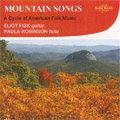 Yet
another MusicMasters recording saved from oblivion by Nimbus
and brought to you as a CD-quality download by MusicWeb International
and High Definition Tape Transfers. The download includes a
(short) booklet of notes with information on Robert Beaser,
whose music (or even name) I had never before encountered. Though
the folk music which he sets shares a common ancestry with that
of the British Isles, most of his arrangements are unmistakably
American. Coupled with arrangements of better-known music by
the likes of MacDowell (the inevitable Wild Rose included)
and Stephen Foster (Beautiful Dreamer) and lesser-known
works of William Schuman and Charles Ives, this is an attractive
issue. When you’ve tried the Chandos Summertime recording,
this could well be your next port of call. The recording and
flac download are faithful.
Yet
another MusicMasters recording saved from oblivion by Nimbus
and brought to you as a CD-quality download by MusicWeb International
and High Definition Tape Transfers. The download includes a
(short) booklet of notes with information on Robert Beaser,
whose music (or even name) I had never before encountered. Though
the folk music which he sets shares a common ancestry with that
of the British Isles, most of his arrangements are unmistakably
American. Coupled with arrangements of better-known music by
the likes of MacDowell (the inevitable Wild Rose included)
and Stephen Foster (Beautiful Dreamer) and lesser-known
works of William Schuman and Charles Ives, this is an attractive
issue. When you’ve tried the Chandos Summertime recording,
this could well be your next port of call. The recording and
flac download are faithful.
see also CD
review by Jonathan Woolf


 All Nimbus reviews
All Nimbus reviews












 I
downloaded this just as I was about to close this Roundup, so
I have had time to hear it all through just once, though I have
listened to some of the concertos several times. I am very impressed
– this could well become my benchmark in future for this wonderful
music, alongside, or even replacing Hogwood (Decca, now Avie),
Standage (Chandos) and Pinnock (DG): everything seems so right
and appropriate in scale that I’m going to choose it as my last-minute
Download of the Month. It may seem odd to single out
the continuo, but even that seems to be exactly in proportion
– just audible but not obtrusive – and imaginative, with organ
(not credited) and a copy of a 1745 harpsichord. The price is
right, too, ranging from £13 for mp3 to £25 for the 24-bit Studio
Master. Make sure that your player will accept 24/88.2 downloads
if you are planning to go for the latter: otherwise, the ‘ordinary’
CD-quality WMA sounds excellent.
I
downloaded this just as I was about to close this Roundup, so
I have had time to hear it all through just once, though I have
listened to some of the concertos several times. I am very impressed
– this could well become my benchmark in future for this wonderful
music, alongside, or even replacing Hogwood (Decca, now Avie),
Standage (Chandos) and Pinnock (DG): everything seems so right
and appropriate in scale that I’m going to choose it as my last-minute
Download of the Month. It may seem odd to single out
the continuo, but even that seems to be exactly in proportion
– just audible but not obtrusive – and imaginative, with organ
(not credited) and a copy of a 1745 harpsichord. The price is
right, too, ranging from £13 for mp3 to £25 for the 24-bit Studio
Master. Make sure that your player will accept 24/88.2 downloads
if you are planning to go for the latter: otherwise, the ‘ordinary’
CD-quality WMA sounds excellent. There
are more recent, highly recommendable versions of all this music,
but Boult has a special touch in this repertoire, making even
Old King Cole well worth hearing: the only other version
that I know of that ballet (Richard Hickox, EMI British Composers
5739862) doesn’t manage that quite so effectively. It is at
least arguable, too, that this version of Tintagel is
preferable to Boult’s own remake on Lyrita (SRCD231 – see
There
are more recent, highly recommendable versions of all this music,
but Boult has a special touch in this repertoire, making even
Old King Cole well worth hearing: the only other version
that I know of that ballet (Richard Hickox, EMI British Composers
5739862) doesn’t manage that quite so effectively. It is at
least arguable, too, that this version of Tintagel is
preferable to Boult’s own remake on Lyrita (SRCD231 – see  After
last month’s service to Moulu, Hyperion have done the same for
Willaert – a little better known, but not by much. That the
main work here, Willaert’s Missa mente tota, was based
on Josquin’s 4-part motet is appropriate, since he lived under
the shadow of his renowned predecessor to such an extent that
his 6-part setting of Verbum bonum et suave was formerly
attributed to Josquin. When the Papal choir discovered that
it was, in fact, by Willaert, his biographer tells us that they
refused to sing it again, a story long believed to be apocryphal,
but given some credence in the Hyperion booklet of notes.
After
last month’s service to Moulu, Hyperion have done the same for
Willaert – a little better known, but not by much. That the
main work here, Willaert’s Missa mente tota, was based
on Josquin’s 4-part motet is appropriate, since he lived under
the shadow of his renowned predecessor to such an extent that
his 6-part setting of Verbum bonum et suave was formerly
attributed to Josquin. When the Papal choir discovered that
it was, in fact, by Willaert, his biographer tells us that they
refused to sing it again, a story long believed to be apocryphal,
but given some credence in the Hyperion booklet of notes.  In
my May 2010 Roundup I recommended two recordings of the music
of Peter Philips, the ‘lost’ English composer, on Hyperion Helios
CDH55254 and Naxos 8.555056, both at budget price. Now Chandos
add to our understanding of Philips with a recording of 25 selections
from the two volumes of Cantiones Sacræ which he
published in Antwerp in 1612. Just four of the items on the
Helios recording and none of those on Naxos are duplicated here.
Better still, the singing is all that we have come to expect
from Trinity College Choir under Richard Marlow; the recording
and lossless transfer are good and the presentation is well
up to standard. I’m only surprised that Chandos have hung on
to this recording for so long. We now have three very good recordings
of Philips’ vocal music to add to Colin Booth’s recording of
his keyboard works which I reviewed some time ago (Soundboard
SBCD992 – see
In
my May 2010 Roundup I recommended two recordings of the music
of Peter Philips, the ‘lost’ English composer, on Hyperion Helios
CDH55254 and Naxos 8.555056, both at budget price. Now Chandos
add to our understanding of Philips with a recording of 25 selections
from the two volumes of Cantiones Sacræ which he
published in Antwerp in 1612. Just four of the items on the
Helios recording and none of those on Naxos are duplicated here.
Better still, the singing is all that we have come to expect
from Trinity College Choir under Richard Marlow; the recording
and lossless transfer are good and the presentation is well
up to standard. I’m only surprised that Chandos have hung on
to this recording for so long. We now have three very good recordings
of Philips’ vocal music to add to Colin Booth’s recording of
his keyboard works which I reviewed some time ago (Soundboard
SBCD992 – see  To
compose seven variations on the same rather mournful theme,
lasting over 20 minutes, followed by 14 other pieces in a similar
vein, without boring the listener is no mean feat, but Dowland,
with the assistance of The Parley of Instruments, brings it
off wonderfully. Melancholy was much in fashion in Dowland’s
day, and the mood in this music, as in many of the other shorter
pieces which conclude the programme, is in tune with the times.
Sir Henry Umptons Funerall, for example, is the musical
equivalent of a fascinating composite picture in the London
National Portrait Gallery, taking us from Umpton’s (or Unton’s)
birth, via his university career, his life in his country mansion,
complete with masque, his diplomacy and death abroad and finally,
taking up most of the picture, a cut-away view of the church
where his funeral is taking place.
To
compose seven variations on the same rather mournful theme,
lasting over 20 minutes, followed by 14 other pieces in a similar
vein, without boring the listener is no mean feat, but Dowland,
with the assistance of The Parley of Instruments, brings it
off wonderfully. Melancholy was much in fashion in Dowland’s
day, and the mood in this music, as in many of the other shorter
pieces which conclude the programme, is in tune with the times.
Sir Henry Umptons Funerall, for example, is the musical
equivalent of a fascinating composite picture in the London
National Portrait Gallery, taking us from Umpton’s (or Unton’s)
birth, via his university career, his life in his country mansion,
complete with masque, his diplomacy and death abroad and finally,
taking up most of the picture, a cut-away view of the church
where his funeral is taking place. I
seem to be going through a phase at the moment of trying alternative
performances of operas which I have never quite come to terms
with. Poppea is one such: I love Orfeo and Ritorno
d’Ulisse, but have found it hard to warm to the third
Monteverdi opera. It can't be because the authorship of the
music is in doubt, or that Monteverdi re-used the music from
Ulisse in the Prologue – he recycled the opening Sinfonia
of the 1610 Vespers in Orfeo and that doesn’t
put me off either masterpiece. Nor do I think it the fault of
my having listened only to the Harnoncourt recording: I know
that his orchestration is a trifle over-lush, but so is his
Ulisse and I got to know that work via the Harnoncourt
LPs. Nevertheless, Gardiner’s version is more to my liking,
with its minimum intervention, strong cast and fine recording,
to which the mp3 transfer does justice.
I
seem to be going through a phase at the moment of trying alternative
performances of operas which I have never quite come to terms
with. Poppea is one such: I love Orfeo and Ritorno
d’Ulisse, but have found it hard to warm to the third
Monteverdi opera. It can't be because the authorship of the
music is in doubt, or that Monteverdi re-used the music from
Ulisse in the Prologue – he recycled the opening Sinfonia
of the 1610 Vespers in Orfeo and that doesn’t
put me off either masterpiece. Nor do I think it the fault of
my having listened only to the Harnoncourt recording: I know
that his orchestration is a trifle over-lush, but so is his
Ulisse and I got to know that work via the Harnoncourt
LPs. Nevertheless, Gardiner’s version is more to my liking,
with its minimum intervention, strong cast and fine recording,
to which the mp3 transfer does justice. This
is worth having for the sake of hearing what King’s College
Choir could do even before the reforming hand of David Willcocks
was laid upon it. It’s all too easy with the benefit of hindsight
to regard the pre-Willcocks period as a kind of prehistoric
time, but Boris Ord’s championship of Gibbons on this recording,
when his music was far from well known, is well worth hearing.
The recording requires a degree of tolerance but the quality
of the performance shines through, offering a fascinating comparison
with the latter-day King’s choir under Stephen Cleobury in 2007
in music by Gibbons, Weelkes and Tomkins which I reviewed in
tandem with a Gimell recording of Tomkins in my recent survey
of The Tallis Scholars at 30 (EMI 3944302 – review
This
is worth having for the sake of hearing what King’s College
Choir could do even before the reforming hand of David Willcocks
was laid upon it. It’s all too easy with the benefit of hindsight
to regard the pre-Willcocks period as a kind of prehistoric
time, but Boris Ord’s championship of Gibbons on this recording,
when his music was far from well known, is well worth hearing.
The recording requires a degree of tolerance but the quality
of the performance shines through, offering a fascinating comparison
with the latter-day King’s choir under Stephen Cleobury in 2007
in music by Gibbons, Weelkes and Tomkins which I reviewed in
tandem with a Gimell recording of Tomkins in my recent survey
of The Tallis Scholars at 30 (EMI 3944302 – review  The
surviving repertoire of music for the recorder from baroque
French composers is, as Pamela Thorby reminds us in the notes,
small in volume but high in quality. Everything here is utterly
inconsequential and totally charming. The performances strike
exactly the right note: a great deal of scholarly thought has
gone into the selection of appropriate instruments alone, as
can be seen from the list which I have appended, but you would
never guess that from the absolute spontaneity of the playing.
With first-rate recording and informative notes, this is an
excellent successor to Thorby’s earlier recordings for Linn.
I chose the CD-quality wma version: my only complaint is that,
unfortunately, Linn’s 24-bit recordings come at too high a sample
rate for Squeezebox. Gimell are more flexible in that they offer
24-bit downloads at 44.1 kHz as well as 88.2 or 96 kHz.
The
surviving repertoire of music for the recorder from baroque
French composers is, as Pamela Thorby reminds us in the notes,
small in volume but high in quality. Everything here is utterly
inconsequential and totally charming. The performances strike
exactly the right note: a great deal of scholarly thought has
gone into the selection of appropriate instruments alone, as
can be seen from the list which I have appended, but you would
never guess that from the absolute spontaneity of the playing.
With first-rate recording and informative notes, this is an
excellent successor to Thorby’s earlier recordings for Linn.
I chose the CD-quality wma version: my only complaint is that,
unfortunately, Linn’s 24-bit recordings come at too high a sample
rate for Squeezebox. Gimell are more flexible in that they offer
24-bit downloads at 44.1 kHz as well as 88.2 or 96 kHz. Homage
to a Spanish Grandee: Selection from Concerti a cinque,
Op.10 (Nos.1-3, 5, 7-8 and 11-12) Concerto primo in B-flat
[6:34]; Concerto secondo in g minor [10:00]; Concerto
terzo [8:11]; Concerto quinto [8:15]; Concerto
settimo [9:03]; Concerto ottavo [9:25]; Concerto
undicesimo [7:17]; Concerto dodicesimo [9:48]
Homage
to a Spanish Grandee: Selection from Concerti a cinque,
Op.10 (Nos.1-3, 5, 7-8 and 11-12) Concerto primo in B-flat
[6:34]; Concerto secondo in g minor [10:00]; Concerto
terzo [8:11]; Concerto quinto [8:15]; Concerto
settimo [9:03]; Concerto ottavo [9:25]; Concerto
undicesimo [7:17]; Concerto dodicesimo [9:48] The
Hyperion budget-price issue is likely to whet your appetite
for more Albinoni, such as the Chandos where Collegium Musicum
90 offer yet another fine recording to add to their already
impressive list of Albinoni albums, this time containing eight
of the Op.10 concertos. I recommended their recording of Op.7/3,
6, 9 and 12 and Op.9/2, 5, 8 and 11 on CHAN0579 in July
2009 – see
The
Hyperion budget-price issue is likely to whet your appetite
for more Albinoni, such as the Chandos where Collegium Musicum
90 offer yet another fine recording to add to their already
impressive list of Albinoni albums, this time containing eight
of the Op.10 concertos. I recommended their recording of Op.7/3,
6, 9 and 12 and Op.9/2, 5, 8 and 11 on CHAN0579 in July
2009 – see  As
might have been expected, since it uses the Rifkin edition,
this recording has already divided critical opinion: for some
reviewers it has been the best thing since sliced bread – there
already were eleven positive reviews on the Linn website when
I downloaded the recording – but others have been left cold.
I’ll come clean at once, for the benefit of those who dislike
long reviews which list the pros and cons and sit on the fence,
and say that parts of this new recording knocked me out, that
it will certainly be a version of the work to which I shall
return frequently, but that ultimately I shall not be throwing
out John Eliot Gardiner’s now classic DG Archiv version.
As
might have been expected, since it uses the Rifkin edition,
this recording has already divided critical opinion: for some
reviewers it has been the best thing since sliced bread – there
already were eleven positive reviews on the Linn website when
I downloaded the recording – but others have been left cold.
I’ll come clean at once, for the benefit of those who dislike
long reviews which list the pros and cons and sit on the fence,
and say that parts of this new recording knocked me out, that
it will certainly be a version of the work to which I shall
return frequently, but that ultimately I shall not be throwing
out John Eliot Gardiner’s now classic DG Archiv version. This
is something of a blast from the past – and I don’t just mean
the age of the recording. Concoctions like this used to be much
more popular: at one time, no primary school assembly could
start without ‘Sheep may safely graze’ from Walton’s arrangement
of Bach, The Wise Virgins. I don’t want to sound snooty,
though – I really enjoy this kind of confection and I was very
pleased to be reminded of this suite from Le Donne di buon
Umore, which began life as a skilful arrangement of sonatas
by Domenico Scarlatti for a Diaghilev ballet.
This
is something of a blast from the past – and I don’t just mean
the age of the recording. Concoctions like this used to be much
more popular: at one time, no primary school assembly could
start without ‘Sheep may safely graze’ from Walton’s arrangement
of Bach, The Wise Virgins. I don’t want to sound snooty,
though – I really enjoy this kind of confection and I was very
pleased to be reminded of this suite from Le Donne di buon
Umore, which began life as a skilful arrangement of sonatas
by Domenico Scarlatti for a Diaghilev ballet. Vintage
performances from early in the career of the Allegri Quartet,
very well transferred and well worth obtaining. This is one
of two High Density Tape Transfer recordings in this month’s
Download Roundup; in addition there are four reviews of Musicweb
International downloads of Nimbus recordings which are being
hosted by HDTT. Having purchased a particular recording, you
will receive an email containing the download link. Make sure
that you type your email address very carefully and retain the
email in case, for any reason, you have to download a track
again – once or twice, for whatever reason, a download terminated
early, but it was very easy to retry.
Vintage
performances from early in the career of the Allegri Quartet,
very well transferred and well worth obtaining. This is one
of two High Density Tape Transfer recordings in this month’s
Download Roundup; in addition there are four reviews of Musicweb
International downloads of Nimbus recordings which are being
hosted by HDTT. Having purchased a particular recording, you
will receive an email containing the download link. Make sure
that you type your email address very carefully and retain the
email in case, for any reason, you have to download a track
again – once or twice, for whatever reason, a download terminated
early, but it was very easy to retry. This
recording features in the MusicWeb International list of
This
recording features in the MusicWeb International list of  These
are revelatory performances, akin to seeing a familiar painting
when it has been restored. Some of it will seem too bright for
some tastes, but the overall impact is thrilling and the whole
may be strongly recommended, even to those who normally steer
clear of ‘authenticity’ in general and the fortepiano in particular.
I haven’t enjoyed hearing these concertos so much since I first
heard the Kempff recordings on DG. Somehow, paradoxically, the
small ensemble makes the music sound larger. I shall still listen
to Stephen Kovacevich and Colin Davis (Philips) and I must reacquaint
myself with those Kempff recordings, but I suspect that I shall
also be returning to Schoonderwoerd pretty frequently. The mp3
transfer is good – most of the tracks are at 256k or 320k. Now
I must search out the two earlier recordings in the series –
somehow they have passed me (and MWI) by unnoticed.
These
are revelatory performances, akin to seeing a familiar painting
when it has been restored. Some of it will seem too bright for
some tastes, but the overall impact is thrilling and the whole
may be strongly recommended, even to those who normally steer
clear of ‘authenticity’ in general and the fortepiano in particular.
I haven’t enjoyed hearing these concertos so much since I first
heard the Kempff recordings on DG. Somehow, paradoxically, the
small ensemble makes the music sound larger. I shall still listen
to Stephen Kovacevich and Colin Davis (Philips) and I must reacquaint
myself with those Kempff recordings, but I suspect that I shall
also be returning to Schoonderwoerd pretty frequently. The mp3
transfer is good – most of the tracks are at 256k or 320k. Now
I must search out the two earlier recordings in the series –
somehow they have passed me (and MWI) by unnoticed. I
like late Beethoven Quartets and Sonatas to sound as if hewn
from solid granite and this recording, now finding a new home
from MusicMasters, largely qualifies. If anything, the playing
is just a little too wayward and uncontrolled – but those are
epithets that his contemporaries applied to Beethoven’s late
works and which still often seem apt. Felstman’s Beethoven divides
opinion almost equally: I’m sure that this recording will also
do that. As a typical Gemini, I shall sometimes make this part
of my listening experience, but at other times I want something
a little less extreme – Stephen Kovacevich, perhaps.
I
like late Beethoven Quartets and Sonatas to sound as if hewn
from solid granite and this recording, now finding a new home
from MusicMasters, largely qualifies. If anything, the playing
is just a little too wayward and uncontrolled – but those are
epithets that his contemporaries applied to Beethoven’s late
works and which still often seem apt. Felstman’s Beethoven divides
opinion almost equally: I’m sure that this recording will also
do that. As a typical Gemini, I shall sometimes make this part
of my listening experience, but at other times I want something
a little less extreme – Stephen Kovacevich, perhaps. That
this, another refugee from MusicMasters, should find a new home
at Nimbus in the Chopin and Schumann anniversary year, with
Liszt’s turn to come next year, seems very appropriate. A spin-off
from Rosen’s book The Romantic Generation, it offers
a fine introduction to the piano music of the period. The playing
is better than reliable throughout, with plenty of nimble finger-work,
if a little cool in places – the treatment lends itself best
to the Liszt Reminiscences of Don Juan. The one unfamiliar
work, My Joys started life as a Chopin Mazurka, but Liszt
transformed it into a Nocturne.
That
this, another refugee from MusicMasters, should find a new home
at Nimbus in the Chopin and Schumann anniversary year, with
Liszt’s turn to come next year, seems very appropriate. A spin-off
from Rosen’s book The Romantic Generation, it offers
a fine introduction to the piano music of the period. The playing
is better than reliable throughout, with plenty of nimble finger-work,
if a little cool in places – the treatment lends itself best
to the Liszt Reminiscences of Don Juan. The one unfamiliar
work, My Joys started life as a Chopin Mazurka, but Liszt
transformed it into a Nocturne. Only
last month I declared myself resolved to tackle Lohengrin,
the last Wagner opera that has so far eluded me – apart from
Rienzi, that is – when the Kempe reissue fell, as it
were, into my lap and reconciled me to an opera with which I
have been able only partly to engage in the Solti recording.
Actually, it’s not the newest version (EMI CLASSICS 4 56465
2 – see
Only
last month I declared myself resolved to tackle Lohengrin,
the last Wagner opera that has so far eluded me – apart from
Rienzi, that is – when the Kempe reissue fell, as it
were, into my lap and reconciled me to an opera with which I
have been able only partly to engage in the Solti recording.
Actually, it’s not the newest version (EMI CLASSICS 4 56465
2 – see  The
rather unsatisfactory Aïda, recently shown on BBC4,
drove me back to seek a download recording to recommend and
to this Callas-Barbieri-Gobbi-La Scala/Serafin version in particular,
despite the reservations which I always feel on hearing Callas.
Reviewing the 70-CD complete Callas studio recordings – no longer
available – Robert J Farr also had some reservations:
The
rather unsatisfactory Aïda, recently shown on BBC4,
drove me back to seek a download recording to recommend and
to this Callas-Barbieri-Gobbi-La Scala/Serafin version in particular,
despite the reservations which I always feel on hearing Callas.
Reviewing the 70-CD complete Callas studio recordings – no longer
available – Robert J Farr also had some reservations: Since
I recommended the Naxos/Marin Alsop recording last month on
the basis of a first hearing, I’ve been listening to the Eighth
Symphony again and comparing it with the versions by Rafael
Kubelík (DG Originals 447 4122) and Iván Fischer,
both coupled with the Ninth. Both, I think, have a slight edge
on the Naxos – good as Alsop and the Baltimore players are,
her rivals sound just a little more idiomatic. John Quinn rightly
thought the Fischer among the best versions of both symphonies
– see
Since
I recommended the Naxos/Marin Alsop recording last month on
the basis of a first hearing, I’ve been listening to the Eighth
Symphony again and comparing it with the versions by Rafael
Kubelík (DG Originals 447 4122) and Iván Fischer,
both coupled with the Ninth. Both, I think, have a slight edge
on the Naxos – good as Alsop and the Baltimore players are,
her rivals sound just a little more idiomatic. John Quinn rightly
thought the Fischer among the best versions of both symphonies
– see  Leslie
Wright made the Fischer his Recording of the Month: “The bottom
line is that this new version of Mahler’s Fourth is now the
one to beat... look no further for your Mahler 4.” – see
Leslie
Wright made the Fischer his Recording of the Month: “The bottom
line is that this new version of Mahler’s Fourth is now the
one to beat... look no further for your Mahler 4.” – see  If
I was disappointed with the Fischer, I need a stronger word
to express my reaction to the NYPO download with Lorin Maazel
at the helm – a conductor whom I have usually found to be more
than reliable, but his first movement of Mahler 4 was enough
to put me off completely – it’s too slow overall but the rubato
which he applies from time to time means that it almost grinds
to a halt. I know that the score says Bedächtig,
nicht eilend – thoughtful, not hurried – but this really
is making haste too slowly: Eile mit Weile can be overdone
and the same is true of the other movements, too. It comes as
a surprise to find that Maazel’s first movement is only a few
seconds longer than Szell (18:02 against 17:25), it seems interminable;
the third movement is just too restfully Ruhevoll at
24:52 against Szell’s 20:52.
If
I was disappointed with the Fischer, I need a stronger word
to express my reaction to the NYPO download with Lorin Maazel
at the helm – a conductor whom I have usually found to be more
than reliable, but his first movement of Mahler 4 was enough
to put me off completely – it’s too slow overall but the rubato
which he applies from time to time means that it almost grinds
to a halt. I know that the score says Bedächtig,
nicht eilend – thoughtful, not hurried – but this really
is making haste too slowly: Eile mit Weile can be overdone
and the same is true of the other movements, too. It comes as
a surprise to find that Maazel’s first movement is only a few
seconds longer than Szell (18:02 against 17:25), it seems interminable;
the third movement is just too restfully Ruhevoll at
24:52 against Szell’s 20:52. When
these Gibson recordings were released in 1960, he was hailed
as one of ‘our younger conductors’. He was to go on to make
several recommendable Sibelius recordings, latterly for the
Chandos label – his Fifth Symphony remains available, coupled
with the Second, at budget price on CHAN6556, download only
from theclassicalshop.net in mp3 and lossless – but these RCA
versions were never surpassed, especially as the LSO was then
on fine form. The Karelia Suite is played relatively
straight and objectively: even the alla marcia begins
without being given quite the degree of bounce that it might
have, so I was slightly disappointed, though things soon really
get under way at around 1:30.
When
these Gibson recordings were released in 1960, he was hailed
as one of ‘our younger conductors’. He was to go on to make
several recommendable Sibelius recordings, latterly for the
Chandos label – his Fifth Symphony remains available, coupled
with the Second, at budget price on CHAN6556, download only
from theclassicalshop.net in mp3 and lossless – but these RCA
versions were never surpassed, especially as the LSO was then
on fine form. The Karelia Suite is played relatively
straight and objectively: even the alla marcia begins
without being given quite the degree of bounce that it might
have, so I was slightly disappointed, though things soon really
get under way at around 1:30. I
recommended the Brodsky Quartet recording of Quartets Nos. 2
and 3 in March 2009 –
I
recommended the Brodsky Quartet recording of Quartets Nos. 2
and 3 in March 2009 –  The
mp3 download of this CD was Chandos’s June 2010 gift to the
subscribers to their newsletter – well worth signing up for.
If you’re not on the list, the CD is worth its modest purchase
price for late-night listening on a Summer evening.
The
mp3 download of this CD was Chandos’s June 2010 gift to the
subscribers to their newsletter – well worth signing up for.
If you’re not on the list, the CD is worth its modest purchase
price for late-night listening on a Summer evening. Some
interesting material is due to come from Beulah Extra in July,
of which, for me, the highlight is the Curzon recording of Schubert’s
Trout Quintet as 1BX41. Having recently bemoaned the fact
that this is no longer generally available separately, I suggested
that it would be very welcome – and here it is. If you have
noted the fact that I have used this as the benchmark for every
Trout that I have reviewed, you won’t even need to wait
for my review to download it when it becomes available.
Some
interesting material is due to come from Beulah Extra in July,
of which, for me, the highlight is the Curzon recording of Schubert’s
Trout Quintet as 1BX41. Having recently bemoaned the fact
that this is no longer generally available separately, I suggested
that it would be very welcome – and here it is. If you have
noted the fact that I have used this as the benchmark for every
Trout that I have reviewed, you won’t even need to wait
for my review to download it when it becomes available. Yet
another MusicMasters recording saved from oblivion by Nimbus
and brought to you as a CD-quality download by MusicWeb International
and High Definition Tape Transfers. The download includes a
(short) booklet of notes with information on Robert Beaser,
whose music (or even name) I had never before encountered. Though
the folk music which he sets shares a common ancestry with that
of the British Isles, most of his arrangements are unmistakably
American. Coupled with arrangements of better-known music by
the likes of MacDowell (the inevitable Wild Rose included)
and Stephen Foster (Beautiful Dreamer) and lesser-known
works of William Schuman and Charles Ives, this is an attractive
issue. When you’ve tried the Chandos Summertime recording,
this could well be your next port of call. The recording and
flac download are faithful.
Yet
another MusicMasters recording saved from oblivion by Nimbus
and brought to you as a CD-quality download by MusicWeb International
and High Definition Tape Transfers. The download includes a
(short) booklet of notes with information on Robert Beaser,
whose music (or even name) I had never before encountered. Though
the folk music which he sets shares a common ancestry with that
of the British Isles, most of his arrangements are unmistakably
American. Coupled with arrangements of better-known music by
the likes of MacDowell (the inevitable Wild Rose included)
and Stephen Foster (Beautiful Dreamer) and lesser-known
works of William Schuman and Charles Ives, this is an attractive
issue. When you’ve tried the Chandos Summertime recording,
this could well be your next port of call. The recording and
flac download are faithful.